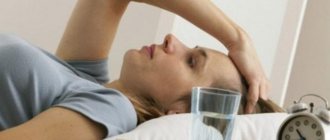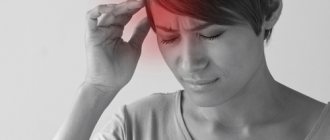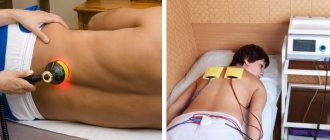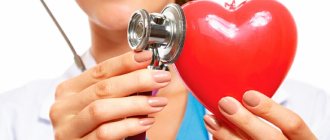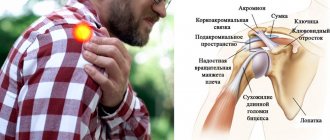Useful articles
Publication date:
A full night's sleep for 6-8 hours is the key to excellent health and high vitality throughout the day. But many people suffer from headaches in the morning, the causes and treatment of which we will try to analyze in this article.
Headache in the morning is a serious symptom, which most likely indicates some kind of imbalance in the human body. Particular caution should be exercised if headaches of greater or lesser intensity occur every morning.
Types of morning headaches
There are many causes of headaches in the morning. This symptom is the body’s reaction to receptor irritation, and therefore occurs with any disorder. Receptors are located in the skin, muscles and soft tissues, meninges, as well as on the inner wall of blood vessels. Depending on the type and mechanism of development, several types of headaches after sleep can be distinguished.
- Vascular headache – this type includes cerebral atriovenous dystonia. One of the mechanisms for the development of pain is stretching of the vascular walls due to increased blood pressure and a decrease in their tone. Pain can also occur when there is a sharp spasm of blood vessels or when there is a violation of the outflow of fluid and its accumulation in the venous bed.
- Tension headaches are caused by muscle spasms in the neck and head. They compress nerves and blood vessels, blocking blood access to the brain. This type of pain can be associated with intense physical or mental stress, stress, and nervous tension. It is also caused by chronic diseases of the cervical spine, intoxication and other factors.
- Neuralgic – associated with inflammation or compression of the trigeminal nerve. The pain is acute, throbbing, and often worsens after sleep or prolonged periods without movement. Neuralgia is characterized by increased symptoms in a certain position, during pressure on the damaged nerve.
- Liquorodynamics - the reason why the head hurts in the morning is a deterioration in the drainage of fluid from the brain. As a result, intracranial pressure increases, which leads not only to constant pain, but also to nervous disorders, problems with hearing and vision, and slow development in children.
- Headache of a psychogenic nature - occurs during stress, sleep disturbances, and nervous tension. During the examination, no pathologies are detected, and the pain is caused by increased activity of the nervous system.
Most patients experience headaches of mixed origin. When diagnosing one problem, several violations are detected simultaneously, which complement each other. It is important to determine which of them is the main one and begin treatment.
Secondary headache and diseases in which it occurs
In general, primary headache, although it disrupts the normal course of life during attacks, does not have serious consequences for a person’s general health. And secondary pain, despite the fact that it occurs much less frequently (in 5% of cases), can be a consequence of a dangerous disease.
Headache is necessarily present among the symptoms of the following diseases:
- vegetative-vascular dystonia (headaches can be combined with dizziness, nausea, fluctuations in blood pressure);
- hypertension (pain is mainly localized in the occipital region, there may be dizziness, noise in the head, spots before the eyes, heat in the head, pain in the heart);
- stroke;
- traumatic brain injury;
- meningitis;
- encephalitis;
- eye diseases (for example, glaucoma);
- diseases of the ear and nasopharynx (otitis media, sinusitis);
- neuralgia;
- diabetes;
- renal failure;
- oncological diseases.
Reasons why your head hurts after sleep
If you have a headache every morning, this may indicate various diseases. They may be associated with vascular or nervous pathologies, infectious and inflammatory processes, as well as other factors. Each disease requires its own treatment regimen, which is prescribed by a doctor.
Sleep apnea
Obstructive sleep apnea is a dangerous disorder that causes breathing to stop for more than 10 seconds. The disease is associated with a blockage of the oropharynx, as a result of which air cannot move through the respiratory tract. Pathology often occurs in people with certain anatomical features: a voluminous base of the tongue or palatine tonsils, a retracted lower jaw, a short and wide neck. Also at risk are people with obesity, thyroid dysfunction, diabetes and cardiovascular diseases.
Sleep apnea can be identified by characteristic signs:
- difficulty breathing or suffocation that occurs during sleep;
- frequent snoring;
- increased fatigue during the day;
- impaired concentration;
- headaches after sleep.
According to statistics, sleep apnea is more often diagnosed in men. There is also a family predisposition - the disease occurs simultaneously in several relatives. Advanced stages can lead to various heart rhythm disturbances and hypertension, which is poorly controlled with medications.
Increased blood pressure
Hypertension is a chronic increase in blood pressure. The disease is diagnosed if the systolic pressure is 140 mm. rt. Art. and higher, diastolic - more than 90 mm. rt. Art. The condition can be caused by heart disease, dysregulation of vascular tone, and slower removal of excess fluid from the body. Elderly people, patients with obesity and endocrine pathologies are at risk. Hypertension can also be triggered by long-term use of hormonal drugs.
With high blood pressure, you often get a headache after sleep. The condition also manifests itself with other characteristic symptoms:
- chronic fatigue, decreased concentration;
- deterioration of hearing and vision;
- frequent headaches - they are pressing, chronic, and often worsen with changes in atmospheric pressure;
- redness of the facial skin and mucous membranes.
If you have hypertension, it is important to monitor your blood pressure using a tonometer. The condition is dangerous because it causes stretching and weakening of arterial walls and can cause stroke and heart attack. To correct blood pressure, medications are prescribed that improve blood flow in the vessels and stimulate the removal of excess fluid.
Infectious diseases
A common reason for a headache in the morning after sleep is respiratory viral diseases. They are manifested by a sore throat, cough, rhinitis, and complications such as conjunctivitis, bronchitis and pneumonia are possible. However, in the initial stages, the only symptom may be a morning headache. If it is accompanied by general weakness and fever, other symptoms develop within a few days.
Precipitating factors that can lead to colds and flu include:
- hypothermia - the incidence rate increases in winter and in the off-season;
- the presence of any chronic diseases;
- pathologies of the immune system – patients are more susceptible to viral infection;
- elderly age.
The main cause of viral respiratory diseases is a decrease in the body's immune defense. The infection constantly reaches the mucous membranes, but immune cells stop their further reproduction. If this does not happen, the virus enters the bloodstream and causes typical signs of disease. For their treatment, antiviral and symptomatic drugs are used, and bed rest is also indicated.
Sinusitis
If you often have a headache in the morning and evening, this may indicate the development of sinusitis - inflammation of the mucous membrane of the paranasal sinuses. They are cavities formed by the bones of the skull. Inflammatory processes cause acute headache, chronic rhinitis, fever and deterioration of smell. The sinuses, which contain air in a healthy person, fill with liquid contents. The fluid may be clear or contain pus due to bacterial infection.
There are several types of sinusitis, depending on the location of the paranasal sinuses:
- sinusitis - one of the most common forms, develops with inflammation of the mucous membrane of the maxillary (maxillary) sinus;
- ethmoiditis - the inflammatory process affects the mucous membrane of the ethmoid bone cells;
- frontal sinusitis - occurs in the frontal sinus, often occurs in a complicated form due to difficult exit of sinus contents;
- sphenoiditis is a pathological process on the posterior part of the ethmoid labyrinth.
Sinusitis can occur as a complication after flu and colds, if you do not complete the full course of treatment and are not completely free from the infection. Diseases also develop after traumatic brain injuries, in which there is damage to the bones that form the paranasal sinuses. Treatment necessarily includes taking antibiotics. If conservative therapy is not effective enough, it is necessary to remove the contents of the sinuses by puncture.
Migraine
If you have a headache every morning, this could be the first sign of a migraine. It is an acute headache that develops without any organic disorders. It is believed to be associated with vascular disorders. The disease often manifests itself simultaneously in several family members, which proves a genetic predisposition.
Migraine often occurs in a chronic form and has a recurrent course. The onset of an attack can be determined by the aura - signs that appear several hours before the headache appears. These include:
- nausea, vomiting;
- cardiopalmus;
- deterioration of health, weakness, drowsiness;
- pallor of the skin and mucous membranes;
- deterioration of hearing and vision, impaired coordination of movements;
- the appearance of auditory and visual hallucinations, including tinnitus and dark circles before the eyes.
According to statistics, migraines often occur in middle-aged women. It can worsen with different frequency, and the duration of each attack ranges from several hours to 2 days. Provoking factors include changes in climatic conditions, fatigue and nervous tension, stress, hormonal imbalance and other factors. Conventional painkillers are ineffective; when diagnosing migraines, specific potent drugs are prescribed.
Other reasons
Before you start taking medications, it is important to find out why you have a headache after sleep. In most cases, occasional headaches do not indicate serious problems. They can occur even in a healthy person and be a consequence of various conditions. Pain in the morning can be caused by various reasons.
- Drinking caffeine before bed is one of the common causes of headaches in the morning. This substance activates the nervous system and stimulates the production of adrenaline into the bloodstream. If these processes occur at night, acute headaches appear the next morning.
- Alcohol abuse is a common reason for headaches in the morning after sleep. Ethyl alcohol causes poisoning and accumulates in nerve cells. It is completely eliminated from the body within 24 hours, and the state of health improves. However, drinking low-quality alcohol or large doses of ethyl alcohol leads to long-term intoxication.
- Diseases of the cervical spine also cause pain in the morning. With osteochondrosis, headaches are triggered by prolonged stay in a stationary position and deterioration of blood supply to the head.
- Violation of the medication schedule or abuse of certain drugs is another cause of morning headaches. So, it manifests itself in diabetes mellitus if you make a mistake with the dosage of medications.
- More dangerous causes that may indicate a headache are meningitis or the appearance of a tumor in the brain. In addition, this symptom may be the first manifestation of a stroke. If it is accompanied by problems with speech or coordination of movements, you must seek urgent medical help.
If you have a headache in the morning and evening, and the pain decreases during the day, this may occur after a disruption in your sleep pattern. Insomnia, alternating night and day shifts, and time zone changes lead to overwork. It is important to give your body proper rest before starting to take headache medications.
Causes of pathology
Serious pathologies that provoke headaches are diagnosed in quite rare cases. Most often, the cause of unpleasant sensations is a violation of lifestyle. By restoring your daily routine, you can completely get rid of headaches, notes Diana Shestopalova, a neurologist at polyclinic No. 5 of the Khimki Regional Hospital .
The primary causes of headaches in the morning after sleep, says Diana Shestopalova, include:
- A pose adopted for a long time in a dream. A person does not control his position, therefore, by accident or under the influence of external factors, he can take a non-physiological position. Some of the vessels passing through the neck to the brain will be blocked, which will lead to oxygen starvation of neurons with the appearance of pain in the head and neck upon awakening.
- Lack of fresh air flow. Our body vitally needs oxygen. Therefore, after sleeping in a room that is not ventilated, we feel even more tired. In the autumn-winter period, when it is cold to sleep with the window slightly open, it is better to allow fresh air into the room 1.5 - 2 hours before going to bed.
- Question answer
How are sleep and cholesterol levels related to human blood? Lack of sleep. Night sleep should last at least 7–8 hours. Only in this case the body is able to completely rest. Prolonged lack of sleep leads to the launch of emergency mechanisms. There is an increase in heart rate and blood pressure may rise. Insomnia, alternating night and day shifts, and time zone changes lead to overwork. Persistent headache appears in the morning. It is important to give your body proper rest before starting to take headache medications.
- Excessive rest is as harmful as its lack. Each person has his own biological rhythms that are comfortable for the body. They are violated by lack of sleep or, conversely, by spending too much time in bed. If a person rests for more than 9 hours, then the amount of serotonin in his body sharply decreases. Namely, it is considered the hormone of happiness. A decrease in serotonin leads to poor blood circulation in the brain, as well as a drop in blood sugar levels, which causes a feeling of fatigue, sleepiness, and headaches.
- Uncomfortable bed or poor sleeping position. The bed should be fairly hard and level, and the pillow should be positioned strictly under the head, without creating an unnatural position for the neck. In addition, doctors do not recommend sleeping on your stomach or side - the position on your back is the most physiologically correct for night rest.
- Bad habits. Even a small amount of alcohol has a toxic and dehydrating effect on the body, and in smokers, the blood vessels of the brain are always in a state of spasm.
- Dehydration. Drinking enough clean water helps the kidneys remove toxins from the body and is a good prevention of headaches.
- Stress, physical fatigue and psycho-emotional overload often act as a trigger for headaches.
- Sleep disorders - snoring, involuntary movements, nightmares, insomnia. All this leads to multiple awakenings during the night and affects the quality of sleep and rest.
All about migraines. Why does this headache appear and how is it treated? More details
However, among the reasons for waking up with a pain in the head there may be more serious ones that pose a health hazard, says the neurologist. “It is almost impossible to cope with them on your own. Therefore, it is better not to hesitate, indirectly contributing to the progression of the pathology, but to immediately contact competent doctors,” warns Diana Shestopalova.
Diseases and conditions that can cause morning headaches:
- Obstructive sleep apnea is a dangerous disorder that causes breathing to stop for more than 10 seconds. The disease is associated with a blockage of the oropharynx, as a result of which air cannot move through the respiratory tract. Pathology often occurs in people with certain anatomical features: a voluminous base of the tongue or palatine tonsils, a retracted lower jaw, a short and wide neck. Also at risk are people with obesity, thyroid dysfunction, diabetes and cardiovascular diseases. If the cause of morning sickness is apnea, then you need to consult a doctor. He will help you choose a special device to use during night sleep. This device will maintain constant pressure within normal limits.
- Bruxism is a pathology in which a person grinds his teeth, clenches them tightly, causing a characteristic grinding sound. According to statistics, the phenomenon occurs in 20% of the world's population. And among people who suffer from morning headaches, the phenomenon is observed in 45%. Why does bruxism cause headaches in the morning? Because pathology causes a number of changes, such as sleep disturbances, sudden awakenings, pain in the jaw muscles, the risk of apnea, dull pain in the temple area.
- Question answer
Is it true that interrupted sleep is harmful? Depression. In the body of a person who is in a depressed state, a low level of “happiness hormones” is detected. Such patients often experience sleep problems. Insomnia may develop. Or constantly alternate between lack of sleep and oversleep. All these factors lead to regular headaches. This requires qualified assistance from an experienced specialist.
- Hypertension is a chronic increase in blood pressure. The disease is diagnosed if the systolic pressure is 140 mm. rt. Art. and higher, diastolic - more than 90 mm. rt. Art. The condition can be caused by heart disease, dysregulation of vascular tone, and slower removal of excess fluid from the body. Elderly people, patients with obesity and endocrine pathologies are at risk. Hypertension can also be triggered by long-term use of hormonal drugs. If you have hypertension, it is important to monitor your blood pressure using a tonometer. The condition is dangerous because it causes stretching and weakening of arterial walls and can cause stroke and heart attack.
- Infectious diseases. A common reason why you have a headache in the morning after sleep is respiratory viral diseases. They are manifested by a sore throat, cough, rhinitis, and complications such as conjunctivitis, bronchitis and pneumonia are possible. However, in the initial stages, the only symptom may be a morning headache. Other symptoms develop over several days.
- Imbalance of hormones in the body.
- Hematoma after head injury.
- Arteritis, inflammation of the temporal arteries.
- Diabetes.
- Glaucoma.
- Chronic sinusitis.
- Food poisoning.
- Allergic reactions.
- Tumors (including malignant) of the brain or adrenal glands.
- Meningitis.
Problems on the head. What leads to migraine and how not to confuse it with a stroke Read more
Examination methods
Diagnosis of headaches is carried out using complex techniques, tests and equipment. A simple examination is not enough to determine the cause of morning discomfort and poor health. The doctor may prescribe a set of examinations, which include:
- blood tests - a way to determine viral and bacterial infections, hormonal disorders, poisoning, vitamin imbalance and other diseases;
- Ultrasound, cardiography – techniques for examining the heart to identify defects, heart rhythm and conduction disturbances, congenital and acquired structural anomalies;
- Dopplerography - ultrasound diagnostics of blood vessels using a contrast agent, prescribed if insufficient blood supply to the brain is suspected;
- MRI of the head and neck is an informative diagnostic method for identifying neoplasms, acute and chronic diseases, and examining the cervical spine.
The Clinical Brain Institute has all the conditions for a complete examination for headaches. Modern equipment, doctors with many years of experience, the ability to obtain accurate results are our main advantages.
When to see a doctor
If the headache appears one-time or has objective causes, you can cope with it yourself. For this there are analgesics - Nurofen, Analgin, Ketorol. You can take them no more than 2 times a week. If this does not help, you need to think about going to a specialist.
Signs that you need to see a doctor:
- The pain occurs more often than 2 times a week.
- This was not observed before, but now headaches often occur, especially in people over 50 years of age.
- The attack is accompanied by stiffness in the neck.
- There was a head injury or a situation in which it could have been caused.
- In addition to pain, the person has nausea, fever, vomiting, but there are no acute respiratory viral infections or other diagnosed infections.
- The attack is accompanied by loss or clouding of consciousness, double vision.
If you have headaches, you should consult a therapist or a neurologist immediately. The doctor will order an examination and find out the cause of the condition, and also select the right treatment.
Independent attempts to get rid of pain can lead to complications in the gastrointestinal tract due to painkillers, as well as to aggravation of the underlying disease.
Dear patients! Remember that only a qualified doctor can make an accurate diagnosis, determine the causes and nature of the disease, and prescribe effective treatment. You can make an appointment with our specialists or call a doctor at home by calling 8-(4822)-33-00-33
Be healthy and happy!
Treatment of morning headaches
The treatment regimen is selected individually and depends on the clinical picture, the exact diagnosis, the patient’s age and other factors. It will include several stages aimed at eliminating the root cause of morning headaches and relieving symptoms.
- Drug therapy is prescribed for pain of any origin. The regimen may include the use of painkillers and anti-inflammatory drugs, muscle relaxants, and antispasmodics. For hypertension, diuretics and drugs to correct vascular tone are additionally prescribed. Infectious diseases often require the use of antibiotics to kill pathogenic bacteria.
- Massage, physiotherapy, therapeutic exercises are a complex effective for the treatment of diseases of the cervical spine, inflammatory diseases of the nerves and blood vessels. They help improve blood circulation in the neck and head, relieve muscle spasms, and restore nerve conduction.
- Surgical intervention is used only in cases where drug treatment does not bring results. Surgery may be required to treat purulent sinusitis, remove tumors and hematomas in the neck and head.
Most patients who experience frequent morning headaches are treated at home. It is important to take medications on the schedule prescribed by your doctor, as well as follow additional instructions. If necessary, the Clinical Institute of the Brain has the opportunity to undergo treatment in a hospital setting, under 24-hour medical supervision.
Why does a child have a problem?
The head can bother children regardless of age - it’s not always possible to simply explain it and complain. The main reason is a disruption in the blood supply to the brain. Other reasons:
- imperfection of the child’s autonomic system;
- the onset of a cold;
- kidney problems, endocrine disruption, anemia, rheumatic diseases;
- tooth pain;
- head injury.
Nervous strain due to stress, prolonged work, conflict, serious anxiety. Environmental effects: long stay in an unventilated place, excessive exposure to ultraviolet radiation, long exposure to sunlight.
- Pain in the back of the head. When a child complains of pain in the crown and back of the head, tension is often the cause. Occurs when the neck muscles are overstrained.
- It hurts in my temples. Pain in the temples indicates a disorder of the autonomic system.
- The forehead and top of the head hurt. Occurs before lunch due to increased pressure inside the skull.
- Half of my head hurts. This is how a migraine manifests itself. Unfortunately, the disease can affect young children. It is sharp, appears suddenly, does not depend on the time of day, and worsens within 10-15 minutes. becomes barely bearable.
The location of pain varies
All children have headaches from time to time. About 12% of students do not attend school once a month due to pain in the head. Mild pain appears a couple of times a week - there is no reason to worry. Having reduced the load on the child’s psycho-emotional state, you need to observe the body’s reaction.
If the pain decreases, then the reason is fatigue. The pain may not depend on physical fatigue; it occurs only against the background of emotional overload. The child does not have physical fatigue, but there is mental fatigue from worries, which exhausts him. In this case, the child’s head suffers.
Which doctor should I contact?
After examining the child, the doctor will write a referral to a specialist:
- See a pediatrician if, with pain, your body temperature rises, urination becomes difficult, a rash appears, and cold symptoms occur.
- See an otolaryngologist to rule out chronic problems and inflammation of the maxillary sinuses. A deviated nasal septum or an allergic runny nose in a child makes breathing difficult, and the brain experiences oxygen starvation.
- To a neurologist, who, after studying the picture, will prescribe further examination.
- A neurologist will refer you to an ophthalmologist if you suspect increased pressure inside the skull. The ophthalmologist examines the fundus of the eye.
Prevention methods
Timely prevention will protect against the occurrence of headaches in the morning and the development of dangerous chronic diseases. At home, it is enough to follow a few simple rules to maintain good health after waking up:
- follow a diet that excludes excess salt and spices, instant coffee, and alcoholic drinks;
- give up fatty foods, strong coffee and tea, alcohol before bedtime;
- spend time outdoors, frequently ventilate the sleeping area;
- monitor your weight and regularly engage in light physical activity;
- Consult your doctor about choosing a mattress and pillow.
At the Clinical Brain Institute, you can undergo a complete diagnosis and treatment of headaches that appear in the morning after sleep. Programs are developed individually, depending on the symptoms and data from the initial examination. The center has the opportunity to get advice from experienced specialists of a narrow and broad profile who will be able to make an accurate diagnosis and prescribe the most effective treatment using only the necessary techniques. However, at home it is important to follow all instructions and follow the rules for preventing headaches.


